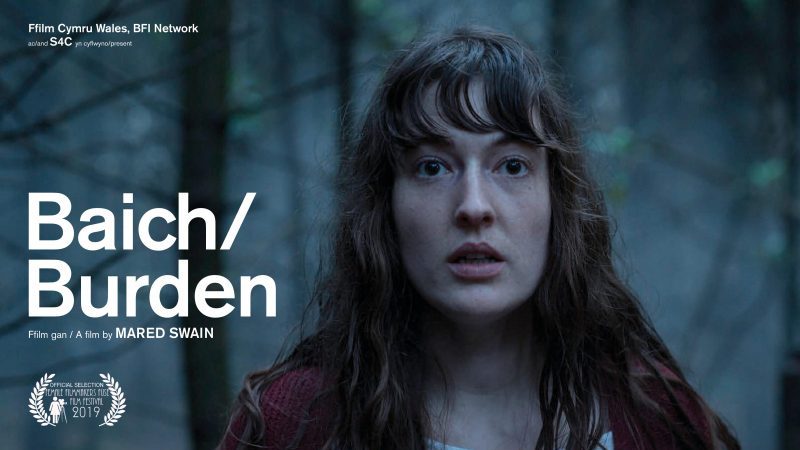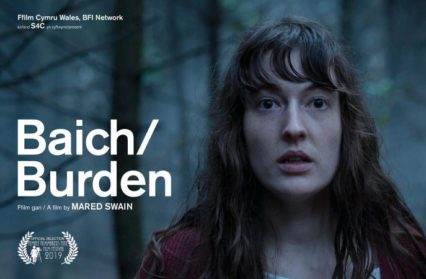Joshua Ludewig revisits Baich (Burden), the debut short film written and directed by Mared Swain released in 2019, reconsidering its examination of the darker side of motherhood.
Upon first release in 2019, Baich unfortunately flew under the radar, despite being one of many short films funded by Ffilm Cymru Wales Beacons scheme. During the short nine-minute runtime, Mared Swain pulls no punches getting the audience to grips with the all-consuming job that is motherhood. The film opens with a distressed Kath (Jarman) undergoing stern questioning by an unnamed man (Rhodri), but before the audience, and Kath herself, can figure out what’s going on, the scene abruptly cuts to a fleeting montage. Surreal shots of a mysterious masked figure chasing Kath through a forest culminate in a harrowing scream before she starts awake in bed. Was it a bad dream, or a premonition? This balance between intrigue and mystery is a testament to Swains masterful storytelling, the back and forth felt throughout the short film.
Swain introduces us to Kath’s everyday life, dealing with quarrels, performing housework and cooking – the many shades of motherhood exposed. However, it quickly becomes clear she’s struggling. Jarman’s performance excellently portrays the realities of being a mum, the thin line between exhaustion and ongoing demand to nurture. Desperate and needing respite, Kath snaps and marches out, leaving her screaming children behind. Upon leaving the house, she finds herself in the middle of a lush forest. Overcome with relief, and exhaustion, she falls asleep but, when she wakes, the once-tranquil forest has transformed into a mirky maze of root and brush. Hearing the cries of her daughters, the feelings of relief switch to frenzied panic as she attempts to find her way back home. The film comes full circle when we return to the scene of Kath’s interrogation. The line of questioning is immediately accusatory -‘What have you done, Kath?’ – Rhodri’s cold performance invoking an ominous atmosphere.

Here Swain begins to indiscreetly push the film’s subtext by choosing a formally dressed male authority figure to question Kath. A fitting reflection of patriarchal society, with his accusatory insinuations indicative of how society treats mothers – without empathy and demonising them when they need support most. Swain’s artistic choices emphasise the societal expectations placed on mothers, the realities of mental health, Kath beginning to call her own sanity into question.
Swain’s use of audio successfully immerses the audience into this brief but evocative story. From the boiling kettle to screaming and bickering, as well as a constant background ringing: it all adds up to convey Kath’s world cracking under pressure, the result is in an overwhelming auditory experience for the viewer. When Kath enters the forest, the noise subsides. Only the ringing sound remains, lingering like an echo, although this too gradually fades as she pushes further into the depths of the woods. Swain interweaves tranquil sounds of nature with the rhythmic beat of Kath’s breathing, which becomes increasingly relaxed. The cinematography really shines here, too, the claustrophobia exchanged for an abundant and expansive forest. But the relief is short-lived, the noises of nocturnal animals transition into something more akin to human screams. It seems that no respite can last long; a drastic shift in tone and aesthetic revises the films genre from a slice-of-life snippet to a dark thriller.
Many of the details of the film are left ambiguous; there is no clear indication whether Kat is actually a single mother or not. In the space of just nine minutes, Baich raises pertinent questions about motherhood – a topic arguably even more pertinent in the years post-pandemic with women shouldering the brunt of unpaid domestic work during COVID-19.
Baich / Burden
Find more details about Baich / Burden here.












